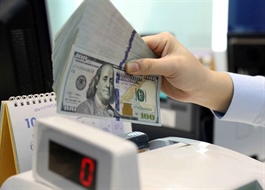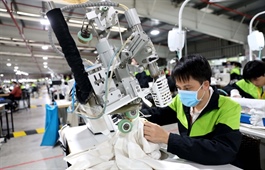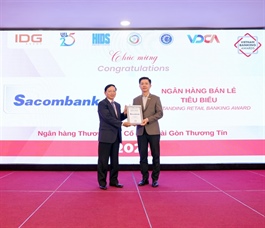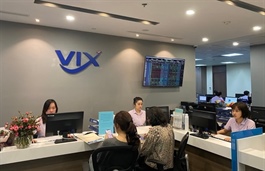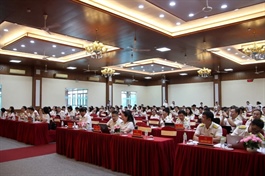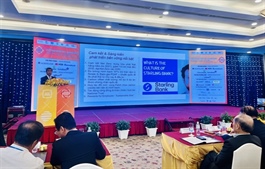Tax procedures for household businesses to be simplified
Tax procedures for household businesses to be simplified
The Ministry of Finance is finalising the revised Law on Tax Administration, aiming to simplify procedures and increase voluntary compliance.
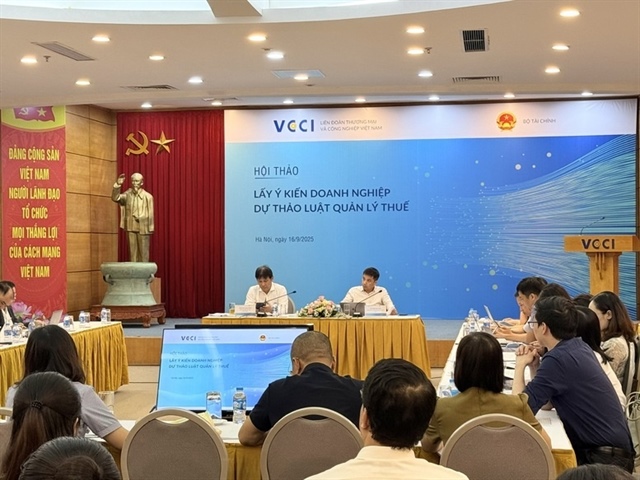
The conference on the draft revised Law on Tax Administration at VCCI's headquarters last week |
The draft law introduces comprehensive reforms, including classification of taxpayers by compliance and risk levels, and streamlined procedures for household businesses to ensure more effective implementation. For this group, the government has called for a thorough impact assessment and the development of practical replacement measures, such as electronic tax declarations and invoicing, with a reasonable transition plan to minimise disruption to business operations.
At the same time, it is necessary to review and improve regulations on late payment interest to ensure effectiveness and feasibility; carefully review to cut and simplify administrative procedures; and study regulations on applying IT and developing databases to simplify and modernize tax management processes.
From the business community's perspective, at a conference on September 16 at the Vietnam Chamber of Commerce and Industry (VCCI), Vu Khac Le from the Vietnam Association of Agents, Brokers, and Maritime Services, proposed to abolish the lump-sum tax scheme for households and individual businesses, while encouraging conversion to enterprise models.
“This is a suitable direction, but requires clear support and guidance during the transition, such as assistance with tax declaration, business model conversion consulting, and digital skills training,” he said and suggested applying flexible tax brackets tailored to different groups and business scales.
Dau Anh Tuan, VCCI's deputy secretary general, said that abolishing the lump-sum tax for household businesses starting from 2026 is an important element of Resolution No.68-NQ/TW of the Politburo on private sector development and is also a necessary step to make the tax system more transparent and modern.
“However, there must be a transition roadmap to help household businesses convert to enterprise models while simplifying accounting and tax declaration procedures in line with their actual capacity, especially small-scale businesses with limited access to technology and accounting expertise,” he emphasised.
Commenting on the same issue, Le Thi Duyen Hai, deputy secretary general of the Vietnam Tax Consultants' Association, acknowledged the tax authority's significant efforts in rolling out electronic invoices, but noted that many household businesses still face challenges in implementation.
“Therefore, if applied in 2026, there should be a transition period allowing household businesses to prepare and adapt, as well as a grace period for penalty exemptions or support mechanisms to give household businesses confidence during the transition,” she suggested. “This would align with the spirit of Resolution 68 and Resolution No.198/2025/QH15 of the National Assembly, which mandates abolishing the lump-sum tax in 2026, but not from January 2026.”
Responding to these comments, Dang Ngoc Minh, deputy director general of the Tax Department under the Ministry of Finance, stated that the revised Law on Tax Administration will ensure a 44 per cent reduction in administrative procedures as required by the government, based on comprehensive reform and facilitating voluntary compliance through taxpayer compliance and risk classification.
"According to the regulation, from January 1, 2026, the annual revenue threshold for household businesses subject to tax will be VND 200 million ($8,000). This means household with annual revenue below $8,000 will not be required to declare or pay tax. To further support household businesses, the Tax Department plans to raise this threshold to VND400-500 million ($16,000-20,000)," he said.
Regarding accounting procedures for household businesses, Nguyen Thi Thanh Hang, head of the International Tax Policy Division of the Tax Department, said that Circular No. 88/2021/TT-BTC on accounting regimes for household and individual businesses is being amended.
“Households with annual revenue between $8,000 and VND3 billion ($120,000) will use very simple declaration forms, only keeping records of revenues and expenses. Household businesses with annual revenue between $8,000 and under VND1 billion ($40,000) will be encouraged to use electronic invoices with tax authority codes,” she emphasised.
“Those with annual revenue above $120,000 are expected to apply accounting regimes similar to micro-enterprises, as their scale is equivalent,” Hang added.
- 08:00 23/09/2025







